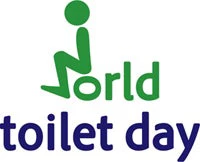
As we acknowledge the first official UN World Toilet Day on November 19, it is worth reaffirming the significance of this very simple instrument, which the Economist hails as the most important invention in the 20 th century, and its potential impact on the world.
Shockingly, there are 2.5 billion people today who don’t have access to a safe means of disposing human feces, which contain pathogens that cause diarrheal disease. Access to sanitation is one of the most off-track of the Millennium Development Goals. Over 1 billion people defecate in the open, contaminating the area where children play, the agricultural fields where people gather food and the rivers used for drinking water.
Thousands of children die every day from related diarrheal disease. In infants it can cause malnutrition, which can lead to stunted growth and impaired cognitive development with negative consequences for school performance as well as poor health outcomes later in life. A recent World Bank report finds that open defecation can account for much or all of the excess stunting in India.
In addition to the health impacts, the social and economic costs are also staggering. India’s economy alone loses roughly US$53.8 billion per year, or the equivalent of 6 percent of GDP. In addition to health and morbidity, the losses relate to industry, like tourism, and environmental costs.
Six months ago, our Board endorsed two corporate goals: to end extreme poverty by 2030 and to boost shared prosperity for the poorest 40 percent of the population. We have taken a hard look at what it will take to realize our dream of a world free of poverty.
This will take getting down and dirty, looking into the very depths of extreme poverty, and asking tough questions about what keeps people poor and how we ensure services reach them: How effective are efforts to feed a child and keep them healthy when they lose vital nutrients from food because of diarrheal disease? What kind of education will children receive if they are regularly out sick, or if the school lacks private facilities for adolescent girls going through puberty?
In any given country, when we talk about securing food, water and health, as a development community we need to look the problem square in the eye and ask ourselves, have we at least covered basic human sanitation and hygiene?
This is not an insurmountable challenge. Many countries have done it, including several emerging countries that have done it recently, like Thailand.
To jumpstart progress for the countries furthest behind, there are three things we can do differently.
First, the whole of government can work together to fix sanitation in countries where it is needed most. Leaders of these countries can call on the Minister of Finance to work together with the Ministers of Education, Health, Environment and Commerce, to name a few, to combine efforts to get sanitation right to help the entire country reap the many human, environmental and economic rewards sanitation brings. An investment in sanitation is an investment in a sustainable future. Countries like Malawi have used such approaches in recent years to more rapidly scale up access to water and sanitation than the average in that region.
Second, we can talk about sanitation on a global scale. Talking about feces and toilets is not easy, and I suspect that is in part why many of our clients do not ask for help specifically on sanitation. For our part, the Secretary General of the UN, the Deputy Secretary General and the World Bank are talking about it, and will continue to reach out at the highest political levels. Once there is a decision from the top, things tend to happen. In Bangladesh, the government decided to not only increase access to sanitation, but also to stop open defecation. Since 2000, open defecation has been reduced from 19 percent to 3.4 percent, and nearly 5 million toilets have been built, improving sanitation for 24 million people. The latest figures for Bangladesh from the UN show rapidly declining diarrheal disease and diarrheal mortality.
Third, we can innovate ways to ensure basic water and sanitation services reach the poorest people. For example, cross subsidy policies can be used to ensure benefits of society reach even the poorest households, as was done in Durban, South Africa.
Further, a new World Bank report shows that in addition to governments, the private sector can be a formidable partner in reaching such a massive scale. Their understanding of research into the values held by consumers, marketing, and their innovation of affordable sanitation products and services can catalyze a rapid and lasting scale-up of sanitation access. The report estimates the current total market for improved on-site sanitation services just in Bangladesh, Indonesia, Peru and Tanzania to be worth US$2.6 billion.
The sanitation challenge is an urgent, necessary and achievable step towards ending poverty.


Join the Conversation